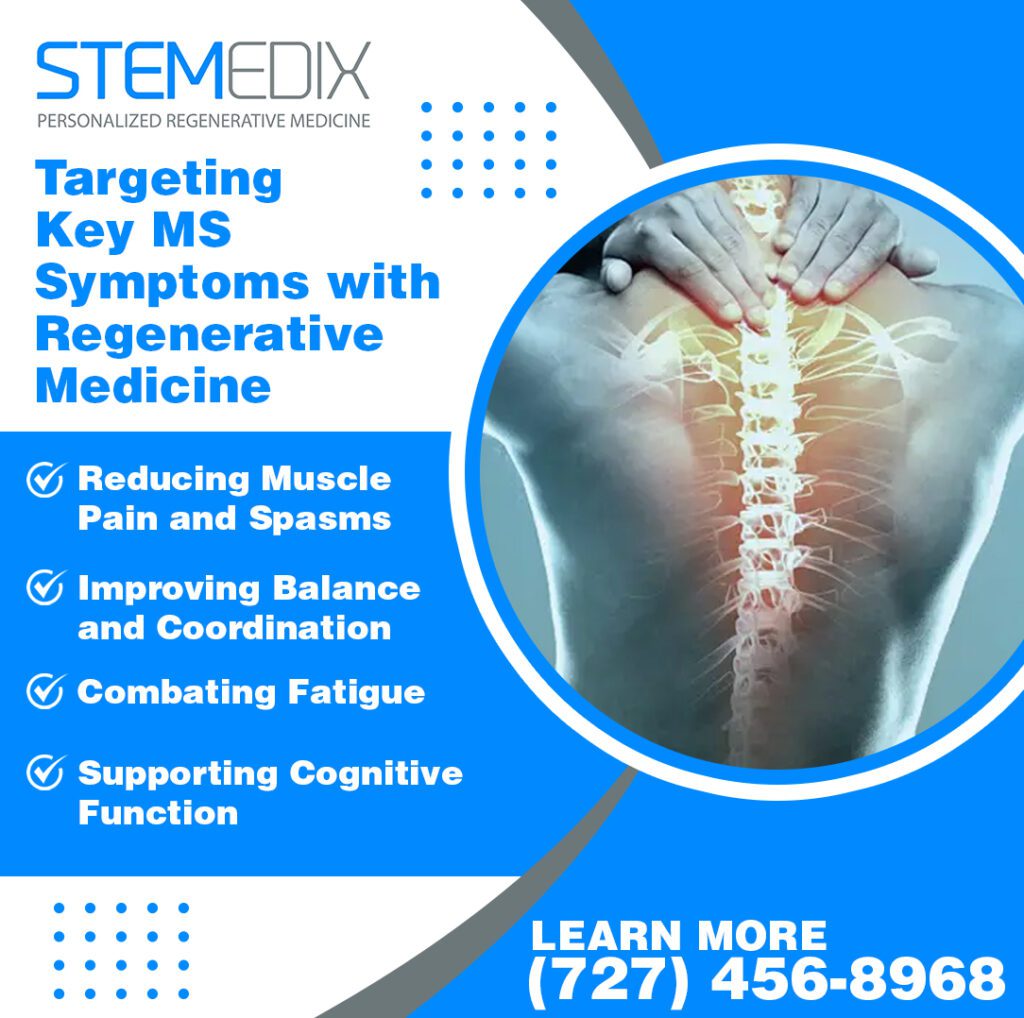
From Fatigue to Balance: How Regenerative Medicine May Transform Multiple Sclerosis (MS) Symptom Management
Living with multiple sclerosis (MS) presents a range of challenges, from fatigue and muscle spasms to difficulties with coordination and balance. Managing these symptoms can be an ongoing journey, with each day bringing new hurdles. At Stemedix, we focus on exploring potential solutions through regenerative medicine, including stem cell therapy, which has shown promise in early studies but remains an experimental approach for addressing some symptoms of MS. While still an evolving treatment option, regenerative medicine may offer a new avenue for those seeking ways to manage their symptoms more effectively. In this article, we will explore how regenerative medicine may help with MS symptom management, offering a look at its potential to alleviate issues such as fatigue, muscle pain, and balance. While results may vary, regenerative medicine presents an option worth considering in the search for a better quality of life.
A Closer Look at Multiple Sclerosis and Its Impact
Multiple Sclerosis (MS) is a chronic autoimmune disease that affects the central nervous system, specifically the brain and spinal cord. It happens when the body’s immune system mistakenly attacks and damages the protective covering of nerve fibers called the myelin sheath. This leads to inflammation and disrupts the normal flow of electrical signals between the brain and other parts of the body. As a result, individuals with MS can experience a wide range of symptoms that can vary greatly from person to person.
What is Multiple Sclerosis?
MS affects each person differently, with symptoms varying depending on which part of the central nervous system is impacted. The disease can present in different forms, including relapsing-remitting MS (RRMS), which is the most common, as well as secondary progressive MS (SPMS) and primary progressive MS (PPMS).
Common symptoms include muscle spasms, fatigue, and coordination issues. Muscle spasms can range from mild twitches to painful contractions that restrict movement. Fatigue, which often cannot be alleviated by rest, can make daily tasks feel exhausting. Coordination issues, such as difficulty walking or maintaining balance, are frequent in MS patients. As the disease progresses, more severe symptoms like vision problems, bladder dysfunction, and cognitive impairments may appear.
The severity of MS symptoms can fluctuate, with relapses followed by periods of stability or improvement. These unpredictable changes make managing daily life challenging. Over time, symptoms may worsen, potentially leading to permanent disability. However, MS affects each individual differently, and the progression and impact of the disease vary from person to person.

The Challenges of MS Symptom Management
Managing Multiple Sclerosis (MS) symptoms can be incredibly complex. While there are treatment options available, they primarily aim to manage the immune system’s response, reduce inflammation, and alleviate symptoms. Medications like disease-modifying therapies may help slow disease progression and prevent relapses, but they do not cure MS. While disease-modifying therapies (DMTs) have significantly reduced relapse rates and slowed disease progression, particularly for relapsing-remitting MS, they often come with side effects and do not address all symptoms experienced by those living with the disease.
Other methods, such as pain management, mobility aids, and physical therapy, are commonly used to improve quality of life. However, these focus on symptom management rather than halting the progression of the disease itself. Given the unpredictable nature of MS, finding effective, long-term relief can be challenging, and many individuals must rely on a combination of therapies, lifestyle changes, and ongoing healthcare support to manage their condition. The search for more lasting solutions continues.
At Stemedix, we understand the difficulties associated with MS and the frustration that comes from trying different treatments without seeing lasting results. This is why we’re dedicated to exploring new possibilities, such as regenerative medicine, to offer a different approach to managing MS symptoms and potentially improving overall quality of life.
Regenerative Medicine: A New Hope for MS Patients
Regenerative medicine is an emerging field that holds potential for managing Multiple Sclerosis (MS) by aiming to repair damage caused by the disease, such as the myelin sheath. However, its potential benefits are still being evaluated. In MS, the goal is to repair the damaged myelin sheath that surrounds the nerves, allowing smoother communication between the brain and body. Regenerative treatments promote tissue healing, potentially restoring lost function and offering patients renewed hope for symptom management. At Stemedix, regenerative medicine offers a transformative opportunity for individuals with MS, addressing the damage at a cellular level. By focusing on healing the body’s damaged cells, regenerative medicine provides a potential path forward for MS care, offering a more meaningful way to manage symptoms and improve overall well-being.
A New Approach to MS Treatment
Regenerative medicine explores the potential to repair damaged tissue and restore function by stimulating the body’s natural healing processes. For individuals with Multiple Sclerosis (MS), the myelin sheath—damaged by the immune system—is a key target. While studies indicate that stem cell therapy may support myelin repair, clinical evidence remains inconclusive, and ongoing trials are essential to determine its efficacy. This damage disrupts communication between the brain and other parts of the body, leading to various MS symptoms.
Regenerative treatments aim to create an environment where the body can begin to repair or regenerate this damaged tissue, potentially improving long-term function and quality of life. Rather than solely addressing symptoms, regenerative medicine helps support the body’s ability to heal itself. At Stemedix, we offer regenerative medicine treatments designed to enhance this healing process, which may lead to improvements in mobility, pain management, and overall well-being for those living with MS. By tapping into the body’s innate repair mechanisms, regenerative medicine offers new hope for MS patients.
The Role of Stem Cells in Regenerative Medicine
Stem cell therapy is an emerging regenerative medicine treatment that has garnered significant attention for its potential to assist in the management of Multiple Sclerosis (MS). Stem cells have the unique ability to differentiate into various cell types, including those necessary to repair the myelin sheath. In MS, the damage to the myelin sheath disrupts nerve communication, leading to the symptoms associated with the condition. Stem cell therapy has shown potential in early research to support myelin repair and possibly promote nerve regeneration, but its effectiveness for improving overall function in MS patients is still under investigation and has not been conclusively proven.
This therapy involves using either autologous stem cells (from the patient’s own body) or allogeneic stem cells (from a donor). Once introduced into the body, these stem cells can travel to the damaged areas, where they transform into the required cell types to help repair tissues and reduce inflammation.
While stem cell therapy is still considered an experimental approach, it holds significant promise for MS patients. At Stemedix, we offer personalized care with a focus on innovative regenerative medicine treatments. Our team is dedicated to providing solutions that may lead to improvements in managing MS and offer new opportunities for healing.
How Regenerative Medicine Addresses Common MS Symptoms
Regenerative medicine offers new possibilities for people living with Multiple Sclerosis (MS) by addressing some of the most challenging symptoms associated with the condition. MS can disrupt daily life in various ways, causing muscle pain, difficulty with balance and coordination, fatigue, and cognitive impairments. Stem cell therapy, a key aspect of regenerative medicine, provides a promising way to target and repair the underlying causes of these symptoms.
Alleviating Muscle Pain and Spasms
Muscle pain and spasms are two of the most common and debilitating symptoms for those living with MS. The inflammation and nerve damage caused by MS can result in persistent pain and muscle contractions, which can severely limit movement. Stem cells have the potential to reduce inflammation and promote tissue repair, which may potentially help reduce both pain and spasms. By stimulating the body’s natural healing processes, stem cell therapy may help ease the discomfort that often accompanies MS, enabling patients to regain greater control over their movements and improve their overall comfort.
Improving Coordination and Balance
For many MS patients, impaired coordination and balance are everyday challenges. These symptoms can increase the risk of falls and accidents, remarkably affecting independence. Regenerative medicine offers the potential to enhance coordination and balance by promoting nerve repair and myelin regeneration. Stem cell therapy can potentially repair damaged nerve cells, improving communication between the brain and the body. As a result, patients may experience improvements in mobility, greater stability, and a reduced risk of falls. With the right regenerative treatments, MS patients may find themselves able to move with greater ease and confidence.
Fighting Fatigue and Increasing Energy
Fatigue is one of the most pervasive and frustrating symptoms of MS. The constant feeling of exhaustion can impact nearly every aspect of daily life, from work and social activities to basic physical tasks. Regenerative treatments, such as stem cell therapy, show potential for reducing inflammation and supporting nerve cell health. However, the direct impact of these therapies on fatigue in MS patients remains under investigation, with current evidence suggesting mixed outcomes. By addressing some of the root causes of fatigue, stem cell therapy may provide MS patients with a renewed sense of energy, helping them feel more revitalized and capable of tackling daily tasks with more vigor.
Enhancing Cognitive Function and Concentration
Many individuals with MS also experience cognitive difficulties, including issues with memory, concentration, and mental clarity. These cognitive challenges can further affect a person’s quality of life, making it harder to focus or perform tasks that require attention. Regenerative medicine, specifically stem cell therapy, has the potential to help repair damaged brain cells and improve cognitive function. By promoting neurogenesis (the growth of new nerve cells), stem cells may help improve mental clarity, concentration, and memory retention, offering hope for better cognitive performance and a more active, engaged life.
At Stemedix, we are committed to providing personalized regenerative medicine treatments to address common MS symptoms. Our approach focuses on alleviating muscle pain, enhancing balance, restoring energy, and improving cognitive function. If you’re looking for regenerative medicine near you, Stemedix offers promising solutions that may help improve your quality of life and manage MS symptoms effectively.

The Potential Benefits of Regenerative Medicine for MS Patients
Regenerative medicine holds tremendous promise for those living with Multiple Sclerosis (MS). By focusing on the body’s natural ability to heal and repair, stem cell therapy offers a fresh approach that could help slow the disease’s progression, improve daily functioning, and enhance overall well-being. At Stemedix, we are committed to providing innovative regenerative treatments designed to address the unique challenges MS patients face, offering hope for better outcomes and a brighter future.
Slowing Disease Progression
One of the most significant concerns for people with MS is the potential for disease progression. Over time, MS can lead to increasing disability as nerve cells become damaged and the immune system continues to attack the central nervous system. Stem cell therapy aims to slow or even halt this progression by targeting the underlying causes of nerve damage. Stem cells have the potential to repair damaged myelin and promote the regeneration of nerve tissue. This could result in a slower progression of the disease, allowing patients to maintain a higher level of functioning for longer periods. The ability to slow MS’s progression is a critical aspect of regenerative medicine, and the ongoing research holds great promise for MS patients seeking a more manageable future.
Personalized Care for Better Outcomes
One of the key benefits of regenerative medicine is its ability to be tailored to the unique needs of each patient. At Stemedix, we recognize that every individual with MS experiences the disease differently, with varying symptoms and levels of progression. Personalized care is essential to achieving the best possible outcomes. Our approach involves developing a customized treatment plan that considers your specific health needs, goals, and medical history. By focusing on personalized care, we can provide targeted regenerative treatments that offer the highest potential for success, addressing each patient’s unique symptoms and challenges. This personalized approach allows for more effective management of MS and greater satisfaction with treatment outcomes.
Long-Term Benefits and Improved Quality of Life
While the immediate benefits of regenerative medicine are exciting, the long-term effects can be even more profound. Stem cell therapy has the potential to improve not only the management of symptoms but also the overall quality of life for MS patients. By promoting nerve repair and regeneration, regenerative therapies may help patients regain some of the function and independence lost to the disease. Over time, this could lead to lasting improvements in mobility, cognitive function, energy levels, and overall well-being. For many MS patients, the promise of long-term benefits means more than just symptom relief; it offers the hope of a better, more fulfilling life.
At Stemedix, we are dedicated to helping MS patients experience the potential long-term benefits of regenerative medicine. Through personalized care and innovative stem cell therapies, we strive to provide meaningful improvements that go beyond symptom management and support a better quality of life. Our goal is to help you live more comfortably and with greater vitality, no matter where you are in your MS journey.
Is Regenerative Medicine Right for You?
When considering regenerative medicine for managing Multiple Sclerosis (MS), it’s important to assess whether this treatment option aligns with your unique health profile. At Stemedix, we work closely with each patient to understand their individual needs, making sure that regenerative treatments are both safe and potentially beneficial. The decision to pursue stem cell therapy requires a thorough evaluation, and working with a healthcare provider who specializes in regenerative medicine is key to ensuring the best possible outcomes.
Are You a Candidate for Stem Cell Therapy?
Not every person with MS is automatically a candidate for stem cell therapy. Factors such as the stage of your disease, the severity of your symptoms, your overall health, and your medical history all play a role in determining whether regenerative medicine could be an effective treatment option for you. Younger patients and those with relapsing-remitting MS often respond better to stem cell therapy, as the immune system is still more responsive to regeneration. However, even those with progressive forms of MS may benefit, depending on their condition and treatment goals.
The first step in determining your candidacy for stem cell therapy is a thorough consultation. At Stemedix, our experienced medical team evaluates your medical records and conducts a thorough assessment of your current health. We look at various factors—such as how long you’ve had MS, the type of MS you have, and the progression of your symptoms—to help guide the decision-making process. While regenerative medicine has shown promising results for many patients, each case is unique, and our approach is to provide honest, tailored guidance based on your specific situation.
The Importance of Consulting a Specialist
The potential benefits of regenerative medicine are encouraging, but not every clinic offers the same level of expertise or care. It is important to seek medical advice from a specialist in regenerative medicine, particularly for complex conditions like MS. A knowledgeable professional can evaluate whether stem cell therapy suits your needs and recommend an approach tailored to your unique health status.
At Stemedix, we focus on creating personalized treatment plans to meet each patient’s specific health goals. By combining expertise in regenerative medicine and MS management, our team is equipped to guide you through the process with clarity and care. We work closely with you to understand your concerns, answer questions, and provide detailed information about how regenerative medicine might fit into your overall health strategy.
If you’re searching for regenerative medicine near you, Stemedix offers a reliable resource. We are dedicated to delivering treatments that prioritize safety, effectiveness, and individual needs. Whether stem cell therapy or another option is right for you, our team is here to support you at every step of your journey, helping you make informed decisions about your care.
Stemedix: Your Partner in Regenerative Medicine for MS Treatment
At Stemedix, we recognize the profound impact that Multiple Sclerosis (MS) can have on your life, and we are dedicated to offering innovative regenerative medicine treatments designed to help you achieve better health. Our focus is not merely on symptom management but on addressing the underlying causes of MS-related challenges. By providing patient-centered care, we work with you to develop a personalized treatment plan that aligns with your unique needs and health goals.
Our team of specialists combines expertise in stem cell therapy with a commitment to compassionate care, ensuring you feel supported every step of the way. We take the time to understand your medical history and specific circumstances to create a tailored approach aimed at improving your overall well-being.
Finding regenerative medicine near you doesn’t have to be a challenge. Stemedix, based in Saint Petersburg, FL, offers accessible care with services designed to fit your needs. Let us help you explore how regenerative medicine might offer a pathway to better health and a brighter tomorrow. Contact Stemedix today at (727) 456-8968 or email us at yourjourney@stemedix.com. Let’s explore how regenerative medicine could help you manage MS symptoms and improve your quality of life.





 St. Petersburg, Florida
St. Petersburg, Florida
